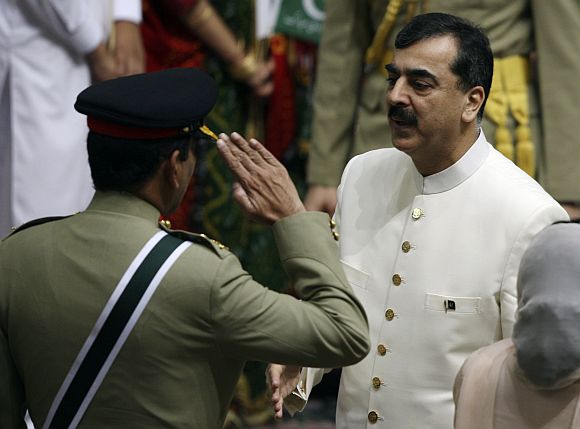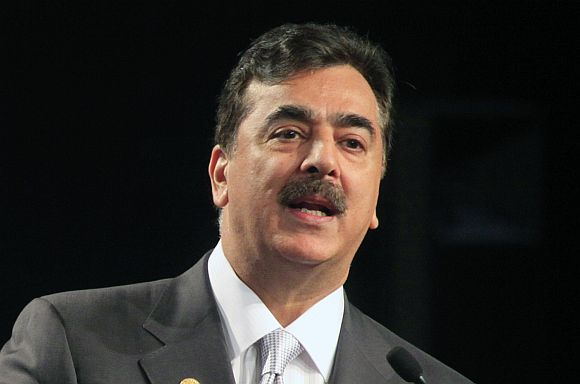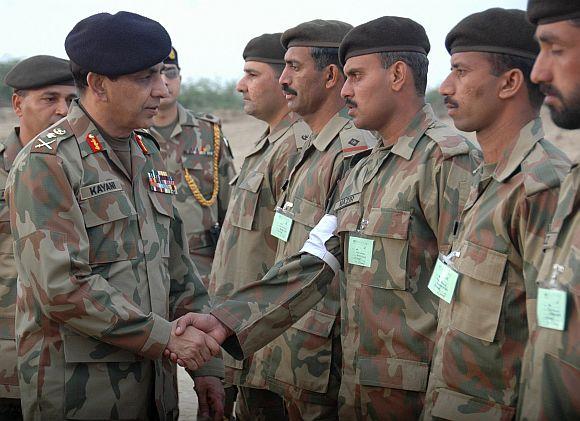Photographs: Reuters
Pakistan Premier Yousuf Raza Gilani on Thursday in an unprecedented tongue-lashing against the powerful military said it is "unacceptable" if the army "considers itself a State within State" and warned that "conspiracies" are being hatched to "pack up" his government.
Prime Minister Gilani also strongly criticised the army for failing to detect Osama bin Laden's presence in the country and said government firmly stood with the institutions and fully protected them after the 2008 Mumbai attacks.
Addressing an official function organised to commemorate the birth anniversary of Pakistan's founder Muhammad Ali Jinnah, Gilani said, "I want to make it clear today that there are intrigues and conspiracies going on and the conspiracy is to pack up the elected government."
"I want to tell them that whether we are in government or opposition or among the people, we will fight for the rights of the people of Pakistan," he said without naming those who were behind the conspiracies.
...
'Nobody can say they are not under the government'
Image: Pakistan PM GilaniPhotographs: Reuters
People will have to decide whether they want "elected people or a dictatorship", he added as talk of a rift between his government and the military gathers pace.
The premier made a veiled reference to the differences between his government and the army, saying "no institution can be a state within a state".
"Nobody can say they are not under the government. Every institution of this country, including the ministry of defence, is under the prime minister. There should be no ambiguity that anybody can claim that I am independent...If any individual thinks they are not under the government, they are mistaken."
"They are under the government and will remain under the government because we are the elected, chosen representatives of the people of Pakistan," he added.
Speaking later in the national assembly or lower house of Parliament, Gilani further criticised Pakistan's security establishment.
Prime minister's unusual remarks came in the backdrop of tensions between the civilian government and the powerful military over the memogate scandal.
...
'If Army considers itself State within State, it is unacceptable'
Image: File picture of Pakistan army chief Kayani meeting soldiers in an undisclosed location in that countryPhotographs: Reuters
Responding to a point of order of Leader of the Opposition Choudhary Nisar Ali Khan regarding reply of the defence ministry to the Supreme Court that the army and the Inter-Services Intelligence are not subordinate to the ministry, the prime minister said, "If the Army considers itself a State within State, then it is unacceptable," Pakistan's state-run APP news agency reported.
"If they (army) say that they are not under the ministry of defence, then we should get out of this slavery, then this Parliament has no importance, this system has no importance, then you are not sovereign," Gilani said.
Referring to questions being asked in some quarters about visas issued by the government to United States security personnel, Gilani told lawmakers, "We want to ask which visa did he (bin Laden) use to come (to Pakistan)? How he entered Pakistan? That was the cause for which Parliament passed a resolution, why the security was not taken care of."
Gilani, who appeared exasperated, told Parliament that his government had stood by the security establishment when it faced American pressure over bin Laden's presence in Pakistan, last month's NATO air strike and the 2008 Mumbai attacks.
"In the worst circumstances we doubled their salaries. They have to be accountable to Parliament," he said. The differences between the government and the military are linked to the Memogate scandal.
The army and the ISI have urged the Supreme Court to conduct a probe into the alleged memo made public by Pakistani-American businessman Mansoor Ijaz that had sought US help to prevent a feared coup in Pakistan after the killing of bin Laden.




article